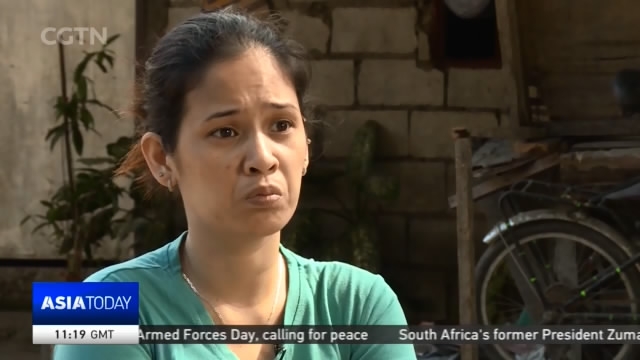
19:32, 27-Mar-2018
Migrant Labor Abuse: Philippines lobbies for better protection

The Philippine government has banned the deployment of its citizens to work in Kuwait after the body of a Filipina maid was found in a freezer in February. Philippine labor officials have reached a draft agreement with the Kuwaiti government. But President Rodrigo Duterte is demanding more protection for Filipino domestic helpers. Millions of overseas Filipino workers elsewhere remain vulnerable to abuse. The Philippine government says it is working on similar deals with other countries. Barnaby Lo has the story.
Nearly four years ago, Joanna Demafelis left her hometown in the Central Philippines in search of better opportunities in Kuwait. Her family didn't expect to welcome her back home in a box. Joanna had been dead for two years before Kuwaiti authorities discovered her body in a freezer. Her death sparked outrage. President Rodrigo Duterte ordered a ban on new deployments to Kuwait.
BARNABY LO MANILA "The death of Filipino migrant worker Joanna Demafelis apparently at the hands of her employer in Kuwait isn't the first such case. In fact, the Philippine government gets calls for rescue every so often especially from domestic helpers working in the Middle East."
Like Joanna, Clarissa dela Cruz was a domestic worker in Kuwait. Sometimes she wonders, she says, if she would have ended up like Joanna had she not been able to get someone to upload video of her employer hitting her onto Facebook.
CLARISSA DELA CRUZ ABUSED VICTIM "She banged my head against the wall. She hit my leg and pierced my shoulder with a club. Later on I learned from my agent that my employers learned about the video. Apparently, they got scared and decided to let me go."
After weeks of negotiations, Kuwait has agreed to prohibit their citizens from keeping their Filipino household employees' passports and from trading them to other employers. But President Duterte wants more – ample food and rest time, for instance – before lifting the ban. The Philippine government is working to strike a similar arrangement with other labor-importing countries in the Middle East, but as long as the so-called Kafala sponsorship system remains in place, experts say there is no guarantee of an end to abuses.
BRIGIDO DULAY OVERSEAS WORKERS WELFARE ADMINISTRATION "It ties down the worker to a certain employer who can grant the entry visa and can also deny the exit visa. So in a sense, the worker is at the mercy of the sponsor."
Clarissa vows to never go back to working in a foreign household, but with four children to raise, she says she isn't closing her door to other kinds of jobs overseas. It's a sacrifice millions of other Filipinos continue to make while economic opportunities remain bleak in their homeland. Barnaby Lo, CGTN, Manila.

SITEMAP
Copyright © 2018 CGTN. Beijing ICP prepared NO.16065310-3
Copyright © 2018 CGTN. Beijing ICP prepared NO.16065310-3